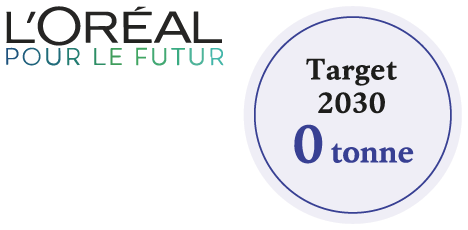 0 tonne ☑
0 tonne ☑
In 2022, all the Group’s factories and distribution centres reached the goal of achieving “zero waste to landfill” (without regulatory constraints).

☑ The Statutory Auditors have expressed reasonable assurance about this indicator.
Research centres also achieved the objective of “zero waste to landfill” in 2022. For administrative sites, the approach is more recent, but has accelerated.
The achievement of this target is part of the more overarching circular economy approach the Group is engaged in. As far as possible, L’Oréal seeks to promote the local treatment of waste, in order to reduce the environmental impact and to create synergies with other local stakeholders.
4.3.1.2. Involving suppliers in the Group’s transformation
Above and beyond its strict requirements for its own sites, L’Oréal has for a number of years applied an environmental policy to its entire value chain. L’Oréal works in partnership with its suppliers to improve the environmental and social profile of its products via the eco-design and sustainable sourcing of packaging, ingredients, formulas and their method of transportation. This worldwide ecosystem covers all the Group’s needs for packaging, raw materials, subcontracting, production equipment, promotional and advertising articles etc. The commitment and performance of this ecosystem are crucial to the Group’s fulfilment of its objectives.
L’Oréal runs numerous global webinars (Spread the greenvibes). These enable the Group to share its commitment to decarbonisation, outline L’Oréal for the Future to a wider audience and announce different actions. In 2022, more than1,833 suppliers participated in these interactive exchanges.
4.3.1.2.1. Due diligence: selection and assessment of strategic suppliers
A/ Assessing suppliers according to their environmental and social performance
The Group has decided to use the environmental and social performance of its partners and suppliers as a primary selection criterion. The commitments under the L’Oréal for the Future programme fit in with and follow on from those in the Group’s responsible purchasing policy initiated in 2002with the L’Oréal Buy & Care programme.
In 2022, L’Oréal published a new sustainable sourcing strategy focused on four pillars:
- the protection of Human Rights;
- the preservation of the environment and resources;
- the integrity of business relationships; and
- diversity, equity and inclusion.
This strategy includes commitments, objectives and monitoring tools for each pillar. The values and standards are shared with suppliers. Meanwhile the objectives are based on collaboration with external experts using recognised benchmarks. This common framework integrates these issues into the heart of the business model in order to achieve sustainable performance.

This diagram shows the 4 pillars of the Group’s sustainable sourcing strategy, which are:
- Integrity of business relationships
- Diversity, Equity and Inclusion
- Preservation of the environment and resources
- Protection of Human Rights
The L’Oréal purchasing teams have defined five performance pillars for assessing and selecting suppliers: quality, social and environmental responsibility, innovation, supply chain and service, and competitiveness.
These pillars form the basis for daily performance and long‑term strategies. A global scorecard is used for all purchasing fields. It makes it possible to accurately measure supplier results, in particular their compliance with their corporate social responsibility commitments, which represent 20% of the final assessment.
The CSR strategy and action plans of the suppliers are fully integrated into their relationship with L’Oréal. They are therefore discussed at strategic meetings. The evaluation of suppliers on the CSR pillar is based, in particular, on the compliance of their social audits, the implementation of Solidarity Sourcing projects, and their results in the “CDP Supply Chain” programmes for the reduction of CO2 emissions and the EcoVadis assessment. In 2022, 620 strategy meetings were held.
The suppliers evaluated represent more than 84% of total direct purchases and 17% of indirect purchases.
Since 2016, suppliers have been able to undertake training via the Group on an online site. This training aims to optimise their sustainable development policies by means of e-learning modules, videos and presentations on various topics such as ethics, climate change, social audits etc. This site, which is now accessible to all the Group’s strategic suppliers, is gradually being expanded to all suppliers.
